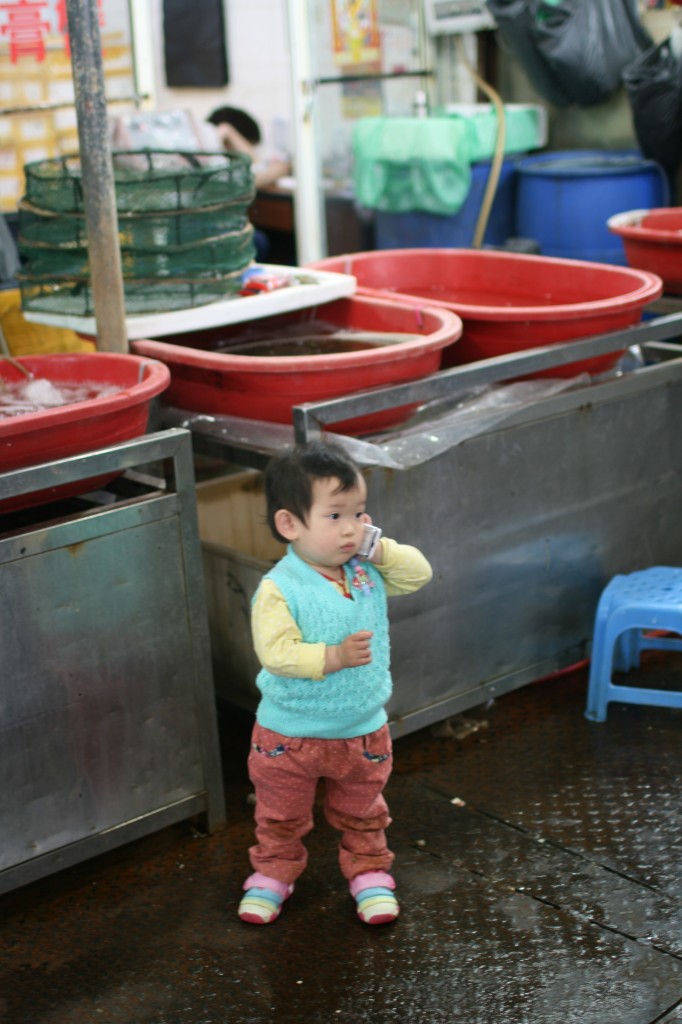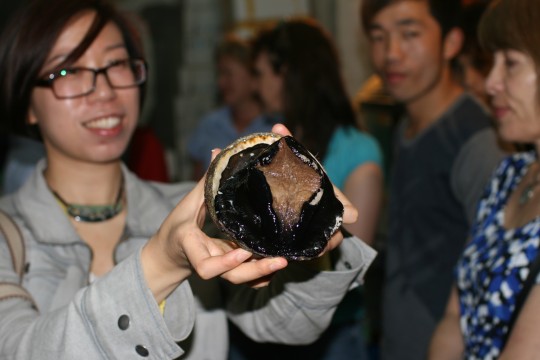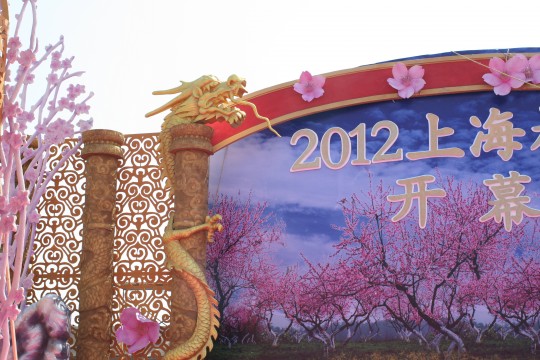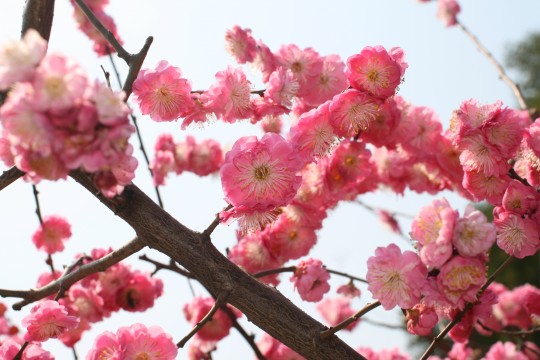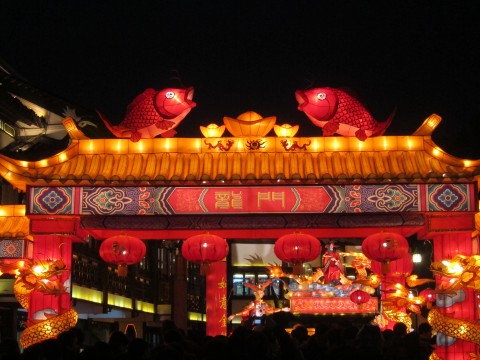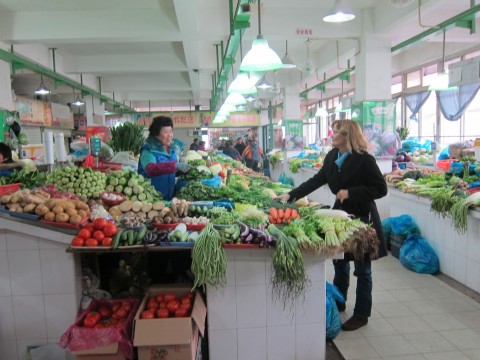Here is a vendor at the fish market, negotiating a deal with his supplier on his iPhone. He has to hop up on the plastic stool to reach the counter, but that doesn’t slow him down much. I read an article in the paper today about a young Chinese woman who started her own vegetable business against some big hurdles, but “she is made of tough stuff and preserved”. In three years, she has achieved annual revenues of 1.5 million yuan (that’s a lot of lettuce). She doesn’t look much older than this little fishmonger.
Category Archives: Shanghai
Tong Chuan Fish Market
The invitation for an expat tour to the Shanghai fish market conjured up a picture of vendors and decrepit carts selling all sorts of wiggly creatures that I would never eat. Yes, it was all that, but also, a community where people live, work, and sell a lot of fish to one of the largest demand markets in the world. Their day begins around 3 am when the fresh supplies arrive from the ships and airports; soon the restaurateurs come through to buy the daily specials, followed by locals, tourists and housewives looking for a freshly caught dinner. By early afternoon, the vendors spray down the sidewalks and retire upstairs to their homes. Our guide, Janny explained that Chinese people like to eat fish brains to make them smarter, turtle to ensure a long life, and seahorse (for men) to increase potency and produce sons.
At the end of the tour, we walked across the street for lunch. I selected a ‘treasure fish’ (looks like a flounder), flopping around… very fresh, for 95 yuan ~ 14 dollars. The restaurant steamed it up with a simple soy sauce and it tasted fabulous. We also had ‘green vegetable’ which I will have to research to find out what it is- prepared with minced beancurd and sesame seeds. I feel a little bad that Fred is hard at work in the office with no prospect of lunch, but I will bring him here for dinner soon!
Watching by your eyes, feeling with your heart
When the plum blossoms begin to fade, spring has arrived with the peach blossoms. We drove into the countryside to a village hosting the peach blossom festival. The peach is the symbol of long life. According to Taoist legend, the gods ate peaches to achieve immortality. Peach blossoms and fruit are prevalent in Chinese art. What a lovely day we enjoyed in the orchards!
桃花 táo huā – peach flower
Who needs a Play ‘n Pack?
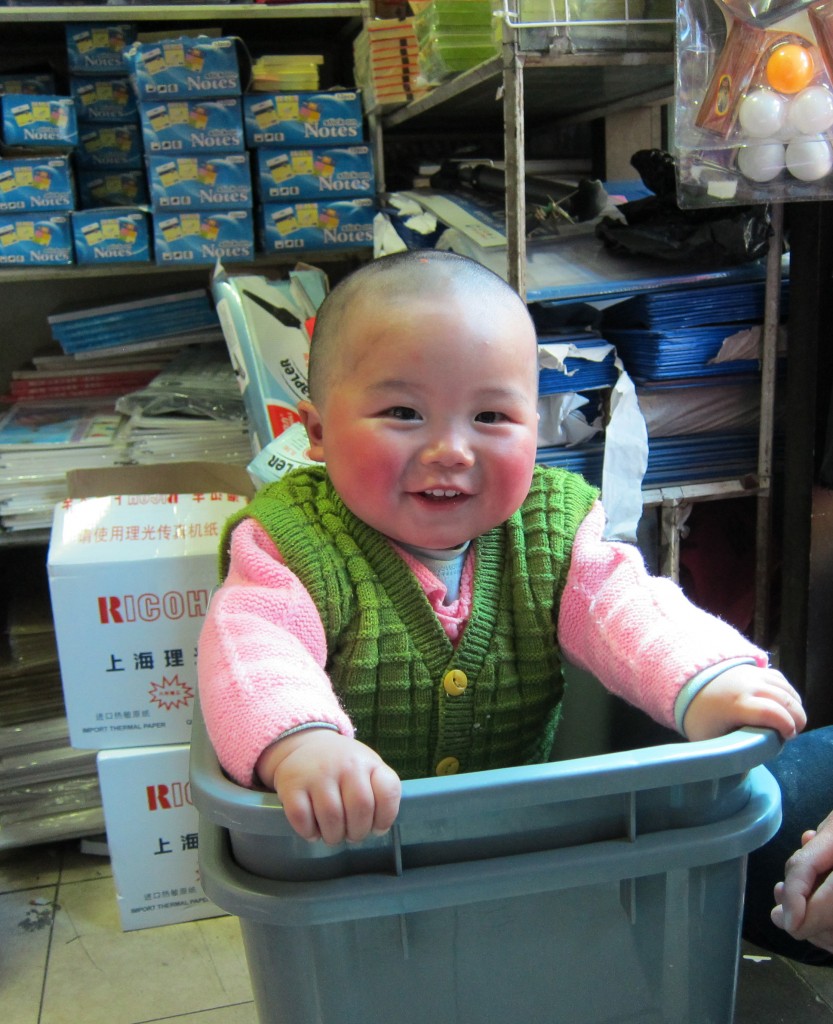 Here is a practical solution to corral this squirmy toddler in the stationary shop! Throughout the street markets, you will find the shopkeeper’s babies and children hanging out while mom and grandmom tend to their customers. Behind the shelves, I often see makeshift lawn chair beds with baby quilts for afternoon naps.
Here is a practical solution to corral this squirmy toddler in the stationary shop! Throughout the street markets, you will find the shopkeeper’s babies and children hanging out while mom and grandmom tend to their customers. Behind the shelves, I often see makeshift lawn chair beds with baby quilts for afternoon naps.
Ask the Plum Blossom…
梅花 Méi huā (may whah) – plum blossom; literally, beautiful flower.
We painted plum blossoms in art class. Mr. Chen shared a Chinese couplet meaning “Ask the plum blossom when Spring comes”. The plum blossom is the flower symbolizing winter because they are the first to bloom. The five petals of the plum bring five blessings. So Fred and I went to Century Park to find the plum blossoms. We agree, they are beautiful!
Lantern Festival
The Spring Festival begins with the Chinese Lunar New Year and runs two weeks, ending with the Lantern Festival. We celebrated at Yu Garden along with several million of our closet neighbors. The plazas were decorated with brightly lit, colorful ‘balloon-like’ animatronic creatures. Of course, the dragon was the favorite display. Overhead, hundreds of elaborate lanterns formed a canopy against the night sky. The crowd was intimidating, and at one point, I was caught in a human eddy which swirled me backwards and Fred forwards at an alarming speed. But all was well in the end, and it was a beautiful sight.
The Year of the Dragon
Happy New Year! xīn nián kuài lè (shin ne-en ku why lur)
Chinese New Year is the most auspicious of holidays and they know how to celebrate. You have never seen fireworks like this! Some of the customs for celebrating the New Year include:
- First, clean the house to sweep out any bad luck.
- Windows and doors are decorated with red symbols for good fortune.
- Red envelopes (Hong Bau) with money are given to children by their parents and also as tips/bonus to employees and service folks.
- A whole fish must be served, but the last bit not eaten, which foretells that the family will have a prosperous year in which there is always food left over.
The Wet Market
I’ve been told that the vegetable markets are called ‘wet markets’ because they hose down the produce in lieu of refrigeration. This is my favorite vegetable market a few blocks from our home. There are many unrecognizable veggies, and everything is fresh and delicious, very flavorful. The veggie lady tries to teach me the names of everything. The man across the aisle laughs loudly when I try to repeat the words in Mandarin. Then, my veggie lady will pantomime the preparation and cooking method for the vegetable in question. It really gets funny when the other vendors join in with their own pantomimes and try to get me to understand. They must think I am hard of hearing and if they just talk louder, I will get it.
You think that’s odd?
Shanghai is pretty much… indescribable, and certainly not what I expected. A few words come to mind: psychedelic, yummy, boisterous, practical and smelly. A few things that seemed odd at first, now I hardly notice:
- The sky scrapers and bridges are lit up at night with brightly flashing, ever changing patterns.
- Horns have a language of their own: tiny toot means pay attention, two short toots means keep moving, one long blast means my vehicle is bigger than yours, and so on.
- Motorcycles drive anywhere they like, including the sidewalks and outdoor markets. The other day, a guy was shopping among the tiny stalls of a market, bought several items and never got off his bike.
- Often, the sidewalks are impassable due to the number of parked bikes, so everyone walks in the street.
- There is no adhesive on the envelopes.
- There is no need to queue up in line, just crowd your way in and keep your elbows out, talking loudly.
- Split pants for babies are very convenient, just hold out the child and let him go on the sidewalk, no need to change diapers.
- Store clerks tend to crowd right in between me and the shelf two feet in front of me, needing to restock, refold or clean at that moment. They make sure I know that I am in their way.
- We hear firecrackers on Saturday mornings from the temple.
- Large fur lined gloves are taped on to the bike handles with duct tape. Stick in hands and rev it up. Very practical.
- There are rarely women’s shoes in the stores larger than about size 7. The clerks giggle and gasp when I ask for my size.
- There are street sweepers who seem to be responsible for a particular block. When their broom wears out, they pull some branches off a tree and bind up a new broom with string.
- You can’t imagine how many things can be transported on bicycles and tricycle trailers. Just name it.
- Many neighborhood restaurants have a large wok burner or 3 ft bun steamer right out on the sidewalk in front of their dining room.
- “Hey lady lady, want buy watch?” is the common greeting in the markets.
- Chinglish signs are hilarious, such as on an elevator: “Not use lift if catches on fire”.
Half A Chicken
 If you buy a half a chicken, you should get your money’s worth, right? Yes, in Shanghai, the half chicken comes with one chicken foot (yes, I mean a claw) and a perfectly bisected head (yes, one eye looking at you). Good thing I grew up in Ree Heights and watched Aunt Lois slaughter the chickens. At least Cousin Jimmy is not chasing me around with the claw, pulling the tendon to make the chicken foot grab my ear.
If you buy a half a chicken, you should get your money’s worth, right? Yes, in Shanghai, the half chicken comes with one chicken foot (yes, I mean a claw) and a perfectly bisected head (yes, one eye looking at you). Good thing I grew up in Ree Heights and watched Aunt Lois slaughter the chickens. At least Cousin Jimmy is not chasing me around with the claw, pulling the tendon to make the chicken foot grab my ear.

